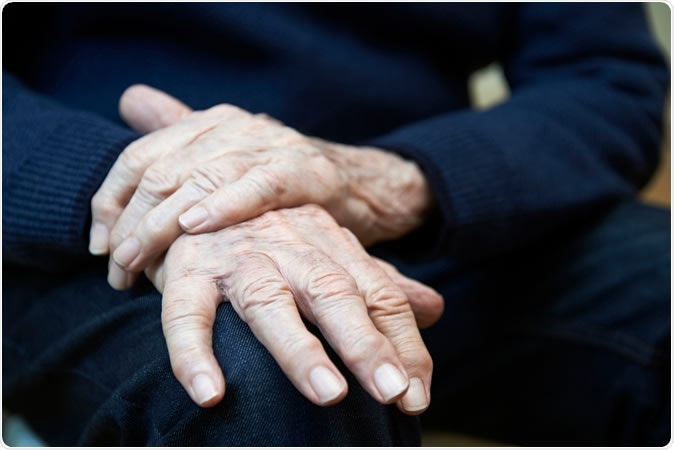Researchers have found that drinking adequate amount of water daily can lower the risk of symptoms of a progressive neurodegenerative disease like Parkinson’s.

Image Credit: SpeedKingz / Shutterstock
In Parkinson’s disease there is progressive damage to the brain leading to movement difficulties, tremors, masked face or lack of facial expressions etc. With time the brain damage is progressive and irreversible. Nerve cells of a particular region of the brain are damaged in this disease.
The new research comes from the charity the Parkinson’s Foundation that says that maintaining normal hydration can help protect against the symptoms of Parkinson’s disease from progressing. Constipation for example is a common symptom of Parkinsonism and adequate water intake can reduce the symptoms of constipation, they explain.
The charity says that a person needs to drink at least six glasses of water per day to obtain the benefits. The statement says, “While there is no prescription for a Parkinson’s disease-specific diet, to maintain overall good health, most people living with Parkinson’s disease should eat a variety of whole grains, vegetables, fruits, milk and dairy products, and protein-rich foods such as meat and beans. Also consider including nuts, olive oil, fish and eggs to your diet, for their beneficial fats. The right foods will also optimise your medications, keep your bones strong, fight constipation and weight loss and maintain general health and fitness. Drink enough water [six glasses a day] and eat fibre-rich foods, including brown rice, whole grains [breads with three grams or more of dietary fibre per slice], fruit and beans to ease digestive difficulties and constipation. Drink alcoholic beverages in moderation, as they have empty calories and few [or no] nutrients.”
Affecting the young
Early onset Parkinson’s disease can affect those in their thirties say experts. Parkinson’s UK observed the World Parkinson’s day recently by conducting an awareness survey among people regarding Parkinson’s affecting the young.
The team surveyed around 2,000 people and found that 24 percent thought that they were too young to get Parkinson’s disease. They found that 22 percent faced situations where their slurred speech and balance problems associated with Parkinson’s were mistaken to be due to drunkenness. Similarly masked face associated with Parkinson’s was mistaken as unfriendliness among 32 percent participants. While 87 percent of the sufferers said that they had faced some form of discrimination or harassment due to their disease, 10 percent said that they had been laughed at. Around 57 percent had cancelled social programmes and meetings for fear of being discriminated or ridiculed.
Gadget detects Parkinson’s easily
Researchers have developed a small gadget that could be worn on the fingers of an individual and could diagnose Parkinson’s disease within 30 seconds.
The gadget uses a small motor that can bend a patient’s middle finger to be able to diagnose Parkinson’s disease by detecting the stiffness of the muscles. The gadget has been called the Bionics Institute Rigidity Device (BiRD) and comes attached with a Velcro strap. It can bend a finger repeatedly for 30 seconds to detect the stiffness. According to researchers stiffness could be the first indication that a person is developing Parkinson’s disease.
According to the Parkinson's UK and the NHS there are no tests at present to detect Parkinson’s accurately and early. This gadget developed by the Bionics Institute, Australia could solve that problem. Inventor Dr Thushara Perera in a statement said, “In the future, patients may be able to use the BiRD at home to monitor their own health. They could then provide a report to their doctor, just like a blood glucose monitor for diabetics. This will help their doctor decide how to give the best treatment to their patients, including which medications to administer.”